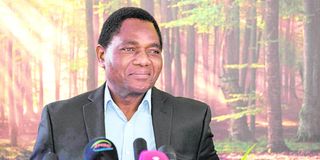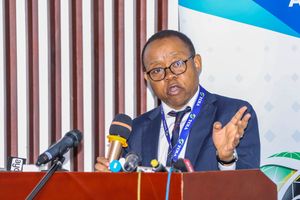Why Hichilema should bring his tormentors to justice

Zambian President Elect Hakainde Hichilema holds a press conference briefing at his residence in Lusaka yesterday after scoring a landslide victory
A presidential election has been completed in Zambia where opposition leader Hakainde Hichilema has achieved a dramatic victory over incumbent Edgar Lungu.
In African elections, it is uncommon for opposition candidates to win and for incumbents to concede defeat. So, this election will be remembered mainly for that reason. However, in all other aspects, this was a typical African experience where the opposition was harassed and repressed all the way until the results came out.
Since 2016 when Lungu became president, Zambian politics has been characterised by diminished political space and politically-motivated violence, according to Amnesty International and the AU. In five years, Hichilema was arrested 15 times. In 2017, Hichilema and five others were incarcerated for four months for “treason”. This made Catholic Bishops condemn the government’s behaviour in the apprehension of the suspects.
During the election, he was banned from campaigning in many parts of the country; his supporters were tear-gassed; he was banned from entering some towns; the national broadcaster didn’t give him space; etc. And on election day, the government blocked social media platforms such as Facebook, Twitter, and WhatsApp, forcing citizens to resort to VPN for access.
Yet, the first thing that Hichilema did as president-elect was to assure his tormentors of their safety from persecution. It’s the same thing that he did in 2017 when he was released from jail: “On behalf of our colleagues…having reflected on everything that happened in light of the word of God…we do hereby forgive all…”
This approach has been celebrated by many who praise Hichilema for focusing on the future rather than the past, focusing on healing rather than revenge. One Tanzanian bishop commented that “this is a Christian thing to do – to forgive”.
Indeed, it has become a tradition in Africa for those who wish to come to power to promise those who are in power for protection against their past misdeeds. The rationale is that without those promises they will not leave power willingly. As admirable as that appears to be, the strategy ignores one aspect – justice.
There may be cases where mercy rather than justice may need to be pursued, for example, the case of Rwanda’s genocide, but what happens in African politics only works to sustain the culture of political impunity. When those who abuse power know that when push comes to shove they will be protected, then what is to stop them from doing that? In short, the cost of injustice has been made too low for people to think twice about paying it. Africa can’t attain true change by licensing injustice.
Democracy implies free and fair competition for political power where those in government seek to provide the best performance possible to sustain them in power and those outside seek to persuade voters that they present the best alternative against those in power. When you suppress the opposition, you remove the incentive for the ruling party to deliver development for the nation. Ultimately, nations end up paying the price of removing political competition.
Think of Tanzania. In early 2014, a minister of finance reputed for his forthrightness dies in office. A few months later, one of the biggest corruption scandals was set in motion and hundreds of billions were siphoned out and pocketed by individuals. The miserable few only got Sh40 million or Sh 80 million, but many pocketed billions – the infamous hela za mboga.
How can people be so daring? The answer is simple – they know that they will be protected. One party’s monopolisation of national politics makes that possible.
It may be asked: whose interests are being served by Hichilema’s assurances? As a Christian he is indeed obliged to forgive others for their wrongs, but when did his personal convictions become national policy? And when did forgiveness become a substitute for justice?
I think that there is a better approach, one that safeguards accountability without making a mockery of justice – enforcing the message that people are free to abuse their offices as much as they can, but they will ultimately pay the price.
Following the battle of Britain in World War II, where Hitler bombed civilian populations in cities such as London, Winston Churchill, the then UK Prime Minister, delivered one of his famous rousing speeches saying:
“If tonight the people of London were asked to cast their vote whether a convention should be entered into to stop the bombing of all cities, the overwhelming majority would cry, ‘No, we will mete out to the Germans the measure and more than the measure, that they have meted out to us’.”
There is something innately human about justice. And that’s what the business of government is all about. When people persecuted you, breaking the law at every turn, justice demands that they should be pursued to the full extent of the law in return that others will be deterred from doing same things in the future. That’s how justice works.
If I were to advise Hichilema my message would be the law demands fulfilment, so make a public example of the bastards. Every police commander. Every governor. Every executive. Every election supervisor. Make injustice so costly that justice will become a no brainer. That’s the Africa Africans dream of.





